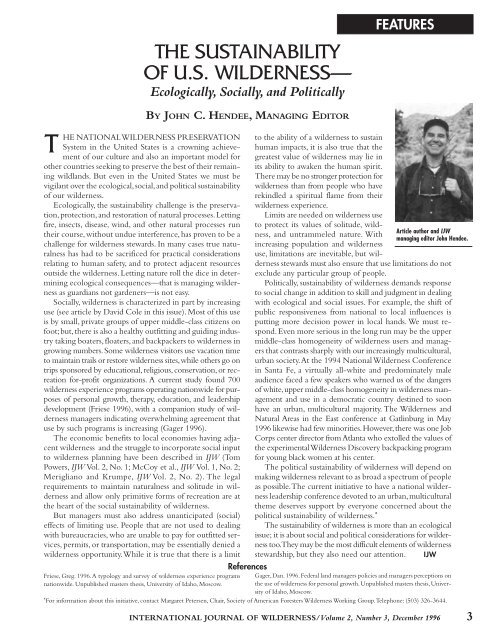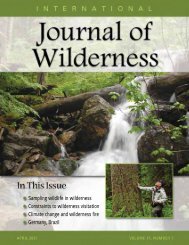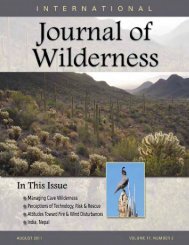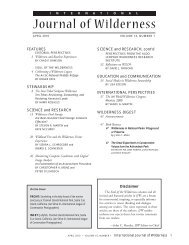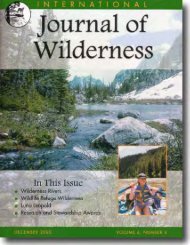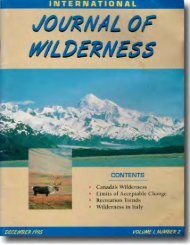P3-Vol 2.No3 Dec 96 - International Journal of Wilderness
P3-Vol 2.No3 Dec 96 - International Journal of Wilderness
P3-Vol 2.No3 Dec 96 - International Journal of Wilderness
Create successful ePaper yourself
Turn your PDF publications into a flip-book with our unique Google optimized e-Paper software.
T<br />
THE SUSTAINABILITY<br />
OF U.S. WILDERNESS—<br />
Ecologically, Socially, and Politically<br />
BY JOHN C. HENDEE, MANAGING EDITOR<br />
HE NATIONAL WILDERNESS PRESERVATION<br />
System in the United States is a crowning achieve-<br />
ment <strong>of</strong> our culture and also an important model for<br />
other countries seeking to preserve the best <strong>of</strong> their remaining<br />
wildlands. But even in the United States we must be<br />
vigilant over the ecological, social, and political sustainability<br />
<strong>of</strong> our wilderness.<br />
Ecologically, the sustainability challenge is the preservation,<br />
protection, and restoration <strong>of</strong> natural processes. Letting<br />
fire, insects, disease, wind, and other natural processes run<br />
their course, without undue interference, has proven to be a<br />
challenge for wilderness stewards. In many cases true naturalness<br />
has had to be sacrificed for practical considerations<br />
relating to human safety, and to protect adjacent resources<br />
outside the wilderness. Letting nature roll the dice in determining<br />
ecological consequences—that is managing wilderness<br />
as guardians not gardeners—is not easy.<br />
Socially, wilderness is characterized in part by increasing<br />
use (see article by David Cole in this issue). Most <strong>of</strong> this use<br />
is by small, private groups <strong>of</strong> upper middle-class citizens on<br />
foot; but, there is also a healthy outfitting and guiding industry<br />
taking boaters, floaters, and backpackers to wilderness in<br />
growing numbers. Some wilderness visitors use vacation time<br />
to maintain trails or restore wilderness sites, while others go on<br />
trips sponsored by educational, religious, conservation, or recreation<br />
for-pr<strong>of</strong>it organizations. A current study found 700<br />
wilderness experience programs operating nationwide for purposes<br />
<strong>of</strong> personal growth, therapy, education, and leadership<br />
development (Friese 19<strong>96</strong>), with a companion study <strong>of</strong> wilderness<br />
managers indicating overwhelming agreement that<br />
use by such programs is increasing (Gager 19<strong>96</strong>).<br />
The economic benefits to local economies having adjacent<br />
wilderness and the struggle to incorporate social input<br />
to wilderness planning have been described in IJW (Tom<br />
Powers, IJW <strong>Vol</strong>. 2, No. 1; McCoy et al., IJW <strong>Vol</strong>. 1, No. 2;<br />
Merigliano and Krumpe, IJW <strong>Vol</strong>. 2, No. 2). The legal<br />
requirements to maintain naturalness and solitude in wilderness<br />
and allow only primitive forms <strong>of</strong> recreation are at<br />
the heart <strong>of</strong> the social sustainability <strong>of</strong> wilderness.<br />
But managers must also address unanticipated (social)<br />
effects <strong>of</strong> limiting use. People that are not used to dealing<br />
with bureaucracies, who are unable to pay for outfitted services,<br />
permits, or transportation, may be essentially denied a<br />
wilderness opportunity. While it is true that there is a limit<br />
Friese, Greg. 19<strong>96</strong>. A typology and survey <strong>of</strong> wilderness experience programs<br />
nationwide. Unpublished masters thesis, University <strong>of</strong> Idaho, Moscow.<br />
References<br />
to the ability <strong>of</strong> a wilderness to sustain<br />
human impacts, it is also true that the<br />
greatest value <strong>of</strong> wilderness may lie in<br />
its ability to awaken the human spirit.<br />
There may be no stronger protection for<br />
wilderness than from people who have<br />
rekindled a spiritual flame from their<br />
wilderness experience.<br />
Limits are needed on wilderness use<br />
to protect its values <strong>of</strong> solitude, wildness,<br />
and untrammeled nature. With<br />
increasing population and wilderness<br />
use, limitations are inevitable, but wil-<br />
FEATURES<br />
Article author and IJW<br />
managing editor John Hendee.<br />
derness stewards must also ensure that use limitations do not<br />
exclude any particular group <strong>of</strong> people.<br />
Politically, sustainability <strong>of</strong> wilderness demands response<br />
to social change in addition to skill and judgment in dealing<br />
with ecological and social issues. For example, the shift <strong>of</strong><br />
public responsiveness from national to local influences is<br />
putting more decision power in local hands. We must respond.<br />
Even more serious in the long run may be the upper<br />
middle-class homogeneity <strong>of</strong> wilderness users and managers<br />
that contrasts sharply with our increasingly multicultural,<br />
urban society. At the 1994 National <strong>Wilderness</strong> Conference<br />
in Santa Fe, a virtually all-white and predominately male<br />
audience faced a few speakers who warned us <strong>of</strong> the dangers<br />
<strong>of</strong> white, upper middle-class homogeneity in wilderness management<br />
and use in a democratic country destined to soon<br />
have an urban, multicultural majority. The <strong>Wilderness</strong> and<br />
Natural Areas in the East conference at Gatlinburg in May<br />
19<strong>96</strong> likewise had few minorities. However, there was one Job<br />
Corps center director from Atlanta who extolled the values <strong>of</strong><br />
the experimental <strong>Wilderness</strong> Discovery backpacking program<br />
for young black women at his center.<br />
The political sustainability <strong>of</strong> wilderness will depend on<br />
making wilderness relevant to as broad a spectrum <strong>of</strong> people<br />
as possible. The current initiative to have a national wilderness<br />
leadership conference devoted to an urban, multicultural<br />
theme deserves support by everyone concerned about the<br />
political sustainability <strong>of</strong> wilderness. *<br />
The sustainability <strong>of</strong> wilderness is more than an ecological<br />
issue; it is about social and political considerations for wilderness<br />
too. They may be the most difficult elements <strong>of</strong> wilderness<br />
stewardship, but they also need our attention. IJW<br />
Gager, Dan. 19<strong>96</strong>. Federal land managers policies and managers perceptions on<br />
the use <strong>of</strong> wilderness for personal growth. Unpublished masters thesis, University<br />
<strong>of</strong> Idaho, Moscow.<br />
* For information about this initiative, contact Margaret Petersen, Chair, Society <strong>of</strong> American Foresters <strong>Wilderness</strong> Working Group. Telephone: (503) 326-3644.<br />
INTERNATIONAL JOURNAL OF WILDERNESS/<strong>Vol</strong>ume 2, Number 3, <strong>Dec</strong>ember 19<strong>96</strong> 3


